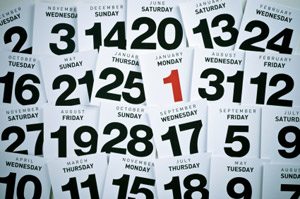This post is by Christy Smith of ThinkBlot Communications.
It was just after Thanksgiving that I realized things had gotten out of hand. It started so innocently. An ebook here, a mini-course there, a free whitepaper—I didn’t even notice I had a problem until it was too late.
After downloading yet another purchase onto my computer (a zip file loaded with over 30 different info products), my eyes widened as I realized I had to scroll, scroll, and scroll some more to find the file I was looking for. My “Document” folder had grown fat and rather useless having gorged on a mountain of information products.
I needed to go on a diet.
Knowing how is half the battle
I’ve been on enough weight loss diets to know that the secret of successful dieting is made up of two parts: reducing what’s being taken in, and maximizing your energy output.
When my gluttony of info gathering began, I had the best of intentions. I was going to stuff my head full of so much knowledge and know-how that I’d become a walking encyclopedia.
Instead I was clogging up my computer memory, and since I wasn’t taking action on anything, I was none the wiser either.
My diet plan
I scurry around the internet all day. It seems like every blog you read has something free that you’ll get in exchange for your email address. And it looks like enticingly good stuff. (Those darn copywriting geniuses!)
But if I download something that I never actually read, then the information is nothing but a waste. Even worse, if I do read it but I don’t take action on any of the ideas in it, then it just languishes in my ever-expanding document file.
So I made an agreement with myself.
I would go through
Only after this exercise was complete could I start downloading products again.
Results not typical
I admit: it’s been a bit tortuous.
People are launching products and giving away amazing content all the time. My finger twitches to click that download link. My mind says “Just one more, it’ll be okay.”
But then my Stern Voice of willpower says, “No” and I force myself to navigate away from the object of my desire.
My Stern Voice is able to keep me in line these days for a few simple reasons:
- My document folder is getting smaller. There were things in there that I didn’t really need. I had gotten them because of the “One Day” factor. I’d be ready for this info “One Day”. I’d want to know more about that thing “One Day”. Once I made the decision to stop living for “One Day” it was easy to see clearly what I could get rid of and not miss.
- I am getting smarter. I’m forcing myself to work through products that promised to teach me things. When you take a break from that data gathering mode and spend some time implementing things, it’s pretty amazing to see what you can do.
- I’m getting excited. I forgot how much information I already had access to! It’s a little like uncovering buried treasure. There were so many things gathering dust in that folder that opening a new file is a bit like opening a Christmas present.
- I realize how far I’ve come. Some of the information that I downloaded six months ago is what I’d consider “entry-level” knowledge now. These are topics that I’ve since gained a lot more knowledge and experience with since then. It’s given me a new found respect and confidence in my skills and abilities.
Stern Voice has also given me a healthy dose of patience. I didn’t gather all of this information overnight, and it’s going to take time to work through all of it. It wouldn’t be fair to just skim it either. I spent some well-earned money on many of them. It’s time to buckle down and be serious.
Ultimately I realized that my information diet was one of the best things I could have done for myself. I forced myself out of the procrastination rut and into doing things that are moving me forward. As with any kind of diet, action speaks louder than words.
Have you ever gone on an Information Diet? What did you learn?
Christy Smith is the Founder and Chief Word Artist of ThinkBlot Communications. As a self-proclaimed Pollyanna, she is always looking on the bright side of any situation. You can find Christy on Twitter at @thinkblotcom.









Recent Comments